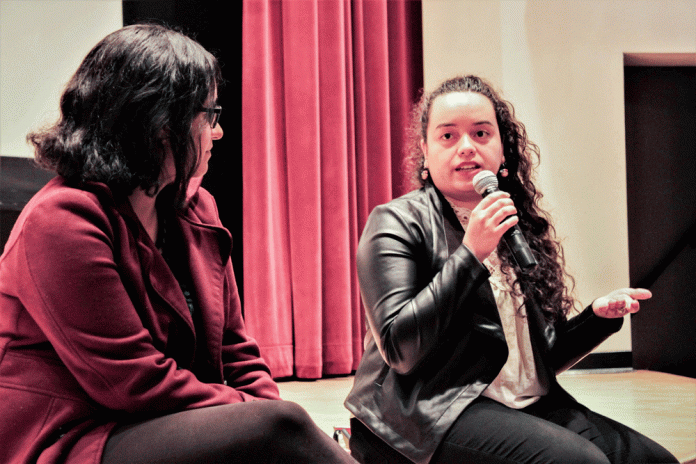Lauren Marnel Shores
On Apr. 12, the MultiCultural Center screened “No Le Digas a Nadie” as part of their Cup of Culture film series. The documentary is about Angy Rivera’s life as an undocumented youth in the United States and her brave journey in “stepping out of the shadows” and speaking up against the injustices against undocumented populations. After the film, Angy Rivera was present for a Q&A session with the audience members.
The title translates to “don’t tell anyone,” a reference to how Rivera’s mother would constantly remind her daughter to hide her undocumented status. This created an invisible wall of secrets between Rivera and those around her, summoning a constant fear of deportation that threatened to rip apart her family.
Fittingly, the documentary is themed around the overcoming of being silenced by fear and the power of utilizing one’s voice. The film surrounds Rivera’s journey in publicly “coming out” about her undocumented status and her political activism to help others in her situation.
Angy explained that “coming out” was her way of taking agency and “doing something to change the reality of being undocumented.” She refused to allow her labels define her, saying that it doesn’t matter what her status is, she deserves to “be here, on this earth, alive,” despite masses of hatred claiming otherwise.
She explained the way she was caught between two cultures, the United States and Colombia (where she was born), but belonging to neither. Her mother, who was born and raised in Colombia, was devastated by her move to the United States. She would cry all year, wanting to go back to her home, but knowing she could never return if she wanted her daughter to have a life away from the drug cartels and human trafficking on her old streets.
After publicly announcing her undocumented status, Rivera started receiving emails asking for advice from others in her situation, inspiring her blog, “AskAngy”, the first and only undocumented youth blog. This was followed by the launch of her YouTube channel of the same name and her increasing involvement in political activism in support of undocumented populations.
Motivated by her sense of new freedom of coming out about her undocumented status, Rivera stepped out once again to share her second, more tragic secret. From the age of four, she was sexually abused by her stepfather, an injustice all too common against undocumented populations. Afraid of deportation, most are too afraid to ask for help.
Much of the film’s power comes from the way in which it humanizes Rivera’s story, reversing the political rhetoric of “being illegal” that allows for the abuse of undocumented populations. Scenes of Rivera and her siblings playing in the park, or the affectionate way Rivera strokes her mother’s hand all remind viewers of the real families that are affected by deportation, and otherwise hatred, from the United States government.
During her Q&A, Rivera answered questions regarding her family life, such as her mother’s new enthusiasm for her daughter’s work and Rivera’s increasing devotion to social justice after graduating college.
She commented on the emotional impact of sharing her story, stating, “I’ll forget how things felt or how much things hurt and they’ll hit me in the middle of a presentation.” Rivera expressed the vulnerability of the film process, and how she has learned “how to say no” to certain questions when viewers assume that her role in the documentary gives them the right to pry at personal topics.
To others still living under the motto “no le digas a nadie,” Rivera explained that “people will come around at their own pace” and to just be patient and share resources on ways to help. In the face of deportation, “this is the time they need it most.”
In regards to the increasing fears about President Donald Trump’s intensifying deportation policies, Rivera reassured, “if no matter what we do, we’re still at risk, then I might as well fight for myself and my family and my friends then be silenced and made to feel afraid.” Although the government claims to only be targeting “criminal individuals,” she reminded the audience that within a moment, “anyone can be criminalized.”
The full documentary will be streaming online for free on PBS’s website for the rest of the month.












Big help, big help. And suelvpatire news of course.
Comments are closed.